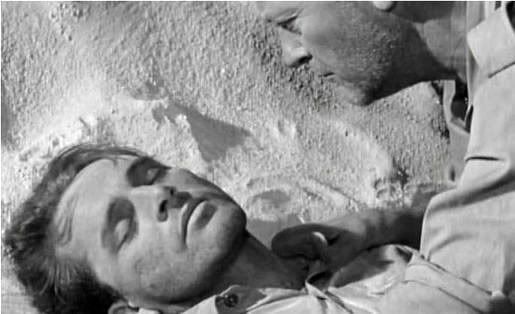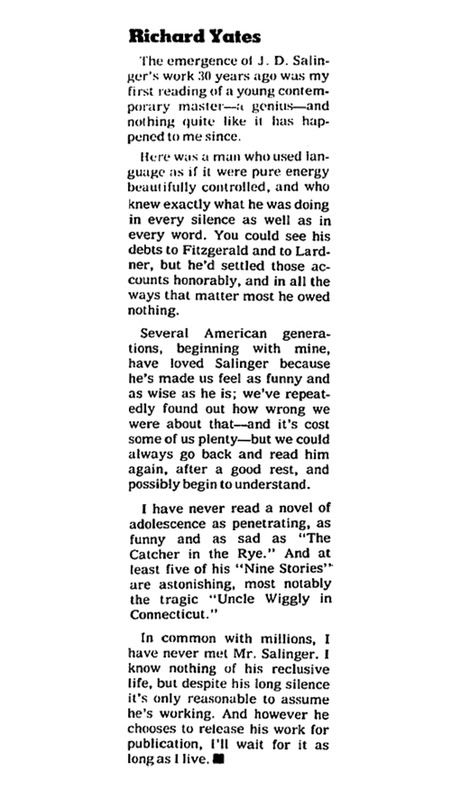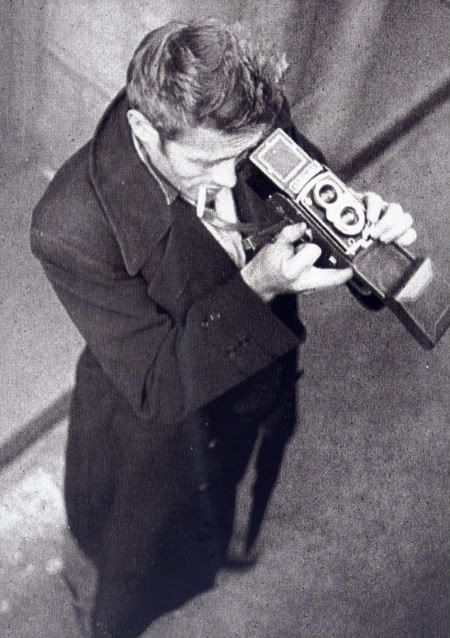sexta-feira, 13 de fevereiro de 2009

O blogue anda moribundo, é fácil de ver. Não o vou declarar morto, não se trata disso. Fui educado, bem ou mal, que existem na vida situações nas quais o mais inteligente é não dizer (escrever) nada. Julgo ser possível manter um blogue sem nada de relevo ter para contar - criando empatia com outros amontoando um conjunto de referências mais ou menos supérfluas (fotografias, transcrições, etc.). É possível, sim, interessante q.b., mas cedo ou tarde aborrece. Isto, um blogue, para mim, é um plano de evasão (roubando o título a Casares) - desgosta-me e desgasta-me se for mais que isso. Aprecio quem tem a dizer o que tem a dizer e se cala (penso em Salinger, lembro os longos períodos de hibernação de Malick.) A verdade é que não ando capaz de mexer, capaz de jogar com as palavras da maneira que queria. Nesse estado, o mais inteligente é mesmo não dizer nada. É o melhor e o mais honesto.
Se Changeling me parece um Eastwood menor* (sujeito a revisão), não deixa de continuar a ser um Eastwood. A discreta perfeição de Mr. Eastwood sai intacta. E esta música final que não me sai por nada da cabeça? Idílica até à exasperação. Thank heaven for Mr. Eastwood.
* Um "filme menor" maior, se quiserem. Eu tenho uma tremenda incapacidade de amar Mystic River, por exemplo, filme consensual até mais não, mas creio que White Hunter Black Heart, por exemplo, tido como "falhanço" por Richard Schickel, o próprio biógrafo de Eastwood, é um dos pontos altos da arte do cineasta. Por exemplo.

(The New York Times, 1977)
* Não sei se já repararam: a edição nacional de Revolutionary Road não tem foto alguma de Richard Yates. Estas minudências afectam-me muito muito.
AMISTAD:Camarónes
/58/
Hoje vim aqui para pedir que me fritassem alguns camarões que trazia no bolso. Esperaria sentado no patamar que os trouxessem, porque não estavas. Não consegui falar. Alguém entreabriu a porta e a fechou logo abruptamente; nem sequer lhe vi a cara. Sabes que onde vivo não há portas nem janelas. A qualquer hora poderás ir lá para um desabafo, uma notícia que tu queres dar-me, te encoleriza ou alegra. Juro-te que não tornarei a tocar a campainha de tua casa.
("Albas", Sebastião Alba, Quasi, página 116)
Hoje vim aqui para pedir que me fritassem alguns camarões que trazia no bolso. Esperaria sentado no patamar que os trouxessem, porque não estavas. Não consegui falar. Alguém entreabriu a porta e a fechou logo abruptamente; nem sequer lhe vi a cara. Sabes que onde vivo não há portas nem janelas. A qualquer hora poderás ir lá para um desabafo, uma notícia que tu queres dar-me, te encoleriza ou alegra. Juro-te que não tornarei a tocar a campainha de tua casa.
("Albas", Sebastião Alba, Quasi, página 116)
terça-feira, 3 de fevereiro de 2009
lembrete: April 14
Tuba-voiced depressive Bill Callahan used to call himself Smog, but he's been going by his given name ever since 2007's Woke on a Whaleheart. That change in moniker was supposed to signal a transition to happier music (or, at least, to less cripplingly bitter music), but in the time since Whaleheart, he broke up with Joanna Newsom, and now she's going out with fucking Andy Samberg.
So we'll see just how committed to positivity Callahan still is on April 14, when his longtime label Drag City releases Sometimes I Wish We Were an Eagle, Callahan's second album under his government name. That grammatically convoluted title makes its own kind of sense. Eagles, after all, don't generally have to worry about losing their girlfriends to sketch comics.
...
entrementes:
Few took notice when Kath Bloom retreated from the New York folk scene in the 1980s. Her disappearance is neither as romantic like Vashti Bunyan's bucolic sojourn nor as storied as Cat Stevens' conversion: On hard times, Bloom moved to rural New England to raise her sons. Two decades later, Australian label Chapter Music has reissued the bulk of her catalogue, including two albums with Loren Connors, Finally in 2005, and the gorgeous Terror in 2008. A tribute album seems like an obvious epilogue to that back-in-print campaign: Loving Takes This Course features testimonial covers by Devendra Banhart, the Concretes, Mark Kozelek, Marianne Dissard, and the Dodos.
The standout track may be Bill Callahan's cover of "The Breeze/My Baby Cries", a devastating medley from her 1982 album with Connors, Sing the Children Over. Bloom sounds so weary on the original-- exhausted by the simple act of living-- and Callahan knows he can't re-create that fragility. Instead, over a simple guitar theme, barely-there percussion, and mood-setting keyboard accompaniment, his self-reflection is more stoic, yet just as emotionally precarious, and his line readings make Bloom's lyrics starkly ominous. There's an entire break-up (mental or romantic, you choose) in the opening lines "I'd like to touch you, but I don't know how," and his insistence that "the breeze will kill me" sounds genuinely haunted and resigned. "The Breeze/My Baby Cries" is that rare find: a cover that adds depth to the original and a tribute album track that sounds absolutely essential.
(aquele início da canção calca-me de uma maneira.)
So we'll see just how committed to positivity Callahan still is on April 14, when his longtime label Drag City releases Sometimes I Wish We Were an Eagle, Callahan's second album under his government name. That grammatically convoluted title makes its own kind of sense. Eagles, after all, don't generally have to worry about losing their girlfriends to sketch comics.
...
entrementes:
Few took notice when Kath Bloom retreated from the New York folk scene in the 1980s. Her disappearance is neither as romantic like Vashti Bunyan's bucolic sojourn nor as storied as Cat Stevens' conversion: On hard times, Bloom moved to rural New England to raise her sons. Two decades later, Australian label Chapter Music has reissued the bulk of her catalogue, including two albums with Loren Connors, Finally in 2005, and the gorgeous Terror in 2008. A tribute album seems like an obvious epilogue to that back-in-print campaign: Loving Takes This Course features testimonial covers by Devendra Banhart, the Concretes, Mark Kozelek, Marianne Dissard, and the Dodos.
The standout track may be Bill Callahan's cover of "The Breeze/My Baby Cries", a devastating medley from her 1982 album with Connors, Sing the Children Over. Bloom sounds so weary on the original-- exhausted by the simple act of living-- and Callahan knows he can't re-create that fragility. Instead, over a simple guitar theme, barely-there percussion, and mood-setting keyboard accompaniment, his self-reflection is more stoic, yet just as emotionally precarious, and his line readings make Bloom's lyrics starkly ominous. There's an entire break-up (mental or romantic, you choose) in the opening lines "I'd like to touch you, but I don't know how," and his insistence that "the breeze will kill me" sounds genuinely haunted and resigned. "The Breeze/My Baby Cries" is that rare find: a cover that adds depth to the original and a tribute album track that sounds absolutely essential.
(aquele início da canção calca-me de uma maneira.)
Subscrever:
Mensagens (Atom)
Arquivo do blogue
blogues
- A Causa Foi Modificada
- a divina desordem
- A montanha mágica
- A Origem das Espécies
- agrafo
- Ainda não começámos a pensar
- Amarcord
- ana de amsterdam
- Animais Domésticos
- Anotacões de um Cinéfilo
- ARCO Argentina ter plaatse
- As Aranhas
- as invasões bárbaras
- Auto-retrato
- avatares de um desejo
- Bibliotecário de Babel
- Bomba Inteligente
- Caustic Cover Critic
- chanatas
- Ciberescritas
- Complexidade e Contradição
- Complicadíssima Teia
- Da Literatura
- dias felizes
- Disco Duro
- Duelo ao Sol
- e deus criou a mulher
- Esse Cavalheiro
- Estado Civil
- ex-Ivan Nunes
- gravidade intermédia
- Horitzons inesperats
- If Charlie Parker Was a Gunslinger, There'd Be a Whole Lot of Dead Copycats
- Intriga Internacional
- irmaolucia
- Joel Neto
- jugular
- Já Chovem Sapos
- lado “b” da minha mente
- Lei Seca
- Life and Opinions of Offely, Gentleman
- Léxico Familiar
- Margens de erro
- Menina Limão
- Mise en Abyme
- O Acossado
- O Anjo Exterminador
- O ente lectual
- O Falso Culpado
- O Inventor
- O Mundo pelos meus Olhos
- O Novo Selvagem
- o signo do dragão
- Ouriquense
- Pastoral Portuguesa
- Phantom Limb
- Poesia & Lda.
- Provas de Contacto
- Quetzal
- Ricardo Gross
- roda livre
- Sete Sombras
- Shakira Kurosawa
- sinusite crónica
- sound + vision
- State Of Art
- terapia metafísica
- the art of memory
- The Heart Is A Lonely Hunter
- umblogsobrekleist
- vida breve
- vidro duplo
- vontade indómita
- Voz do Deserto
«I always contradict myself»
Richard Burton em Bitter Victory, de Nicholas Ray.


